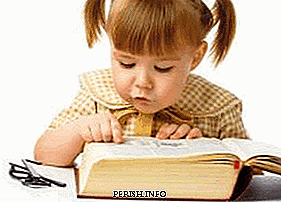 Very often, the parents face the task of preparing a poem for a holiday with a child in a kindergarten or just to entertain and please the guests. However, it may not be included in the plans of the child, and he flatly refuses to memorize the necessary text.
Very often, the parents face the task of preparing a poem for a holiday with a child in a kindergarten or just to entertain and please the guests. However, it may not be included in the plans of the child, and he flatly refuses to memorize the necessary text.
The reason is quite logical, the little man has a fear of a large amount of new information and the brain simply tries to protect itself against overload with this reaction. So how to be in such a situation, how to learn a poem with a child, so that he subsequently would not have the fear of memorizing a new amount of information due to the painful process?
It is necessary to go on little tricks. Before memorizing a poem with a child, you should tell him about the goal you are striving for with him, for example: "Let's learn a poem and expressly tell it at a holiday (or grandparent)" In short, let your child understand that After the process of memorizing and playing the desired text, you and close relatives will be proud of it. This is a gift from him to all your loved ones and loved ones. So, let us analyze the question of how to learn a poem with a child, in stages.
Stage 1
It is necessary to read the poem with an expression from beginning to end. Then, in an arbitrary form, tell the content and focus on incomprehensible words for the child, that is, explain and give examples of where and how these words or phrases can still be used.
Stage 2
Next, you should be interested in the child and hold a conversation together about the content of the poem, for example: about the main character of the poem, whom he met on his way, what he said and so on. This is all necessary for the child to make a complete picture of this text.
Stage 3
After the final analysis of the poem, you should read it a few more times, naturally having interested the child in the game at the end of the reading, but with the condition that he listens and remembers everything carefully. Now you should check how well the child remembers the poem, prompting him only the first word in each line.
Stage 4
The next step is to offer the child to play, for example: you are a teacher, and he is a student or you are a film director, and he is an actor. Let him tell a poem, and you put him a mark or claim the main role in the film, and it's okay if you still have to tell him the first word in the line.
Stage 5
After a while, or rather the next day, you need to repeat the poem again - you read, and the child tells. And at the end, be sure to praise him, expressing his admiration for the way he recites the poem, and even so great.
We connect visual memory
Some children absolutely do not want to sit on the spot, assorting and memorizing the poem. Well, they are very mobile and emotional. But with them you can still disassemble and learn the necessary work, offering to play in the artists on the content of the poem. This will require pencils and album sheets or multicolored crayons and blackboard. Together with the child you need to draw pictures for each line of the poem separately. In this case, the visual memory plus is connected to everything, the child is not bored and he is completely immersed in the process of memorization, and in the complex it is much easier for him to make out, learn, and then tell the poem.
In fact, no matter how strange it may sound, the child himself can answer the question of how to learn a poem with a child. You just need to watch him, because all children individually perceive the new information, someone just need to listen to the poem and he is ready to repeat it completely. Someone perceives through visual memory, then you will need to stock up on albums for drawing and pencils. Some children will find it easier to memorize a poem, surrendering to its rhythm, that is, you can march or dance to read. You can even add elements of sport, for example, use a ball - throw it at each line for each line.
Whatever way you use, they all work very well. The main thing is that for the child the process itself was not a burden, everything should take place with a smile and light mood. And the benefit to the child from this is simply invaluable, it develops many personal qualities, such as the ability to bring the work started to the end, dedication and others. It also trains and develops speech and attention. In general, learning poems with children is a must.
The author - Stanislav Kolesnik
Watch a wonderful and positive video in which a little girl named Alina recites a poem by heart:

Leave Your Comment